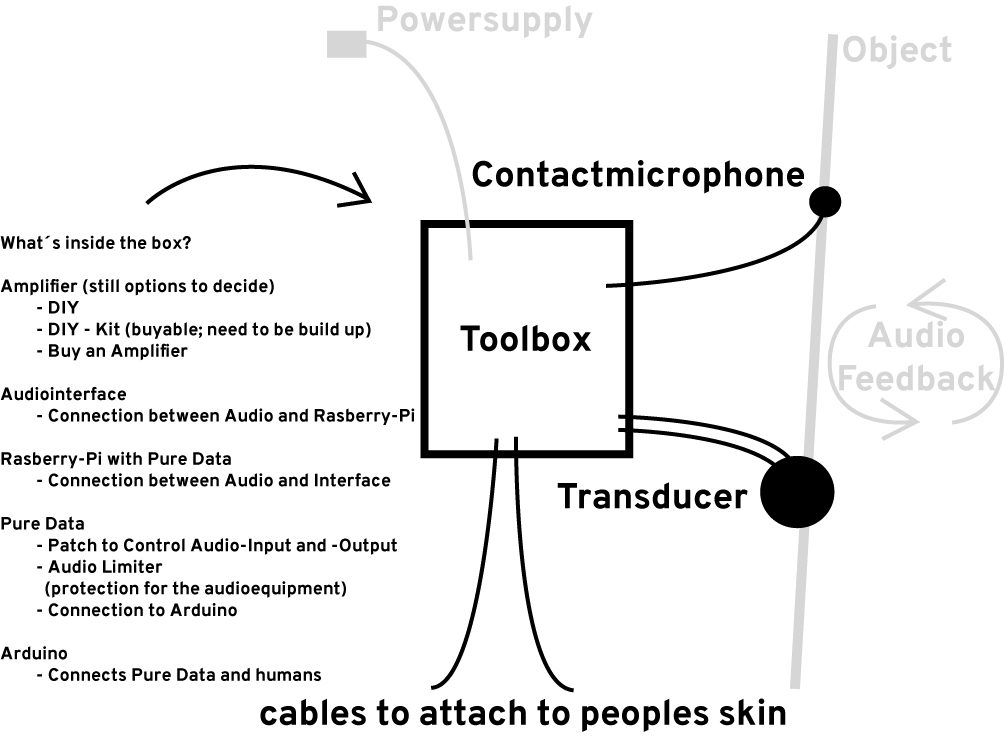No edit summary |
No edit summary |
||
| (8 intermediate revisions by 3 users not shown) | |||
| Line 1: | Line 1: | ||
'''Note:''' | |||
This Site is messing up the MediaWiki Namespace. | |||
Please move it to a subpage of your project-module, or it may be removed without further notice. | |||
[[User:Ms| — Martin Schneider]] 21:44, 4 February 2016 (UTC) | |||
We will connect objects in the room to other objects using the very objects as transmitters for sound (speakers). The Objects are used to transmit the sound of itself by resonating. This we achieve through contact microphones attached to the different objects thus creating a feedbackloop that makes the objects swing and sound and by redistributing the emerging sounds back onto different other objects. | We will connect objects in the room to other objects using the very objects as transmitters for sound (speakers). The Objects are used to transmit the sound of itself by resonating. This we achieve through contact microphones attached to the different objects thus creating a feedbackloop that makes the objects swing and sound and by redistributing the emerging sounds back onto different other objects. | ||
Latest revision as of 21:44, 4 February 2016
Note: This Site is messing up the MediaWiki Namespace. Please move it to a subpage of your project-module, or it may be removed without further notice. — Martin Schneider 21:44, 4 February 2016 (UTC)
We will connect objects in the room to other objects using the very objects as transmitters for sound (speakers). The Objects are used to transmit the sound of itself by resonating. This we achieve through contact microphones attached to the different objects thus creating a feedbackloop that makes the objects swing and sound and by redistributing the emerging sounds back onto different other objects.
What are the objects ? Interesting parts of the interieur, like furniture or iron scaffoldings, handrails or balustrades. They will be chosen in regard how they are sounding. Human bodies. By closing an electrical circuit with human bodies and by the variable resistance of these bodies the sound will be modulated.
We work with our own toolkit by a modular approach: we connect our devices to the room. This would take maybe an hour but should take no more than two hours. The more time we have the better will be the (sound) design.
The installation (or concert) can run permanently and can be stopped whenever it should. It depends on the interaction of the humans.
CONCEPT
One part of this work focuses on the sonification of objects that are usually not sounding. Through a feedback cascade the objects are also showing their own "behavior" or reaction. It is an approach to sound art, improvisation and performance. Ideally very slight touching or other movements of various agents are becoming part of a continuously sounding physical environment. It would be an animation of the non-living static things surrounding us in everyday situations. With their resonances they will speak to us about our own interaction.
touch <–> sounding objects <–> different perception of the room
touch = how do we touch each other ? How does it feel ? how does it sound ? How does the sound change when we change our connections ?
sounding objects = what are the objects ? Where are the objects ? How do they react and sound ?
perception of the room = We are touching each other. Does that change our experience of each other/ of the very situation ? Does the sound change the experience of the room ? (go back to 'touch = …')
We will (re-) define space by the very intense happening of humans touching each other. The modeling of the environment will effect every other interaction and the room itself.
A little gesture can be a trigger for a big event and is amplified within the environment.
A small sensitive event is resonating in the sounding objects of the room. The sensation of human interaction will effect our experience of the environment and is connecting to the interaction of non human objects that shape our experience of the room.
Can we create new senses through our interaction ?
Can we expand our collective experience of touching by projecting the interaction into our environment ?
What will the feedback be like ?
Ideally the whole network of human and non-human actors is producing a different situation and different experiences. It is an ever changing sensitive resonating system.
INFLUENCES: Rolf Julius, Allan Kaprow, Cybernetics, Hylozoism
One Toolbox-Setup:
1x Amplifier
1x Audiointerface
1x Rasberry-Pi
1x Arduino
1-2x Contactmicrophone
1-2x Transducer
2x Long cables (optional more)
1x Powersupply
